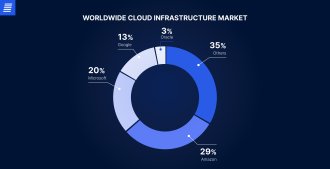
Contact us
Our team would love to hear from you.

In this article, we provide an overview of the prices for computing and storage services provided by the global cloud giants—Amazon Web Services (AWS), Microsoft Azure, Google Cloud Provider (GCP), and Oracle Cloud Infrastructure (OCI). Please note that the prices discussed below are current as of January 2026.
AWS, Azure, and GCP, and OCI are the major leading cloud service providers, together holding a 65% market share in the worldwide cloud infrastructure market third quarter of 2025. Amazon is the leader with a 29% market share, followed by Microsoft with 20% and Google with 13%. According to the statistics, OCI’s market share amounted to 3%


Source: Statista
Each giant offers a large number of services tailored to various computing needs, including infrastructure as a service (IaaS), platform as a service (PaaS), and software as a service (SaaS) solutions. Although these cloud providers may seem interchangeable at first glance, each has unique strengths and challenges that affect the overall cost and experience.
AWS, launched in 2006, is recognized for its extensive service catalog and vast worldwide network, making it a favored choice for organizations looking to scale globally. Its maturity and reliability are well-established, backed by years of operational experience and a broad customer base. AWS offers a comprehensive set of tools for developers, extensive computing services, and a robust ecosystem for Internet of Things (IoT), machine learning (ML), and artificial intelligence (AI) applications.
Azure, launched in 2010, integrates seamlessly with Microsoft’s software offerings, making it a compelling choice for organizations already reliant on products like Windows Server, Active Directory, and Office 365. In addition to its robust hybrid cloud capabilities, which allow companies to bridge their on-premises infrastructure with the cloud, Azure supports fully cloud-based solutions that can be built from the ground up.
Azure also boasts a strong focus on enterprise needs, offering extensive support for various programming languages, frameworks, and tools preferred by businesses.
Launched in 2011, GCP distinguishes itself with leading data management and data analytics technologies. Its expertise in these areas makes GCP an appealing option for organizations that rely heavily on big data and machine learning. GCP’s commitment to open standards and open-source projects makes it an appropriate choice for developers seeking flexible and innovative cloud environments.
Released in 2016, OCI is the youngest of the providers. While less popular than the three giants, it is preferred by companies working on Oracle’s products and needing secure cloud services for their critical workloads.
| AWS | Microsoft Azure | GCP | OCI | |
|---|---|---|---|---|
| Launch year | 2006 | 2010 | 2011 | 2016 |
| Regions | 38 | 70+ | 40+ | 50+ |
| Services | >200 | >200 | >100 | >150 |
| Pricing models | Pay-as-you-go, Saving Plans, Dedicated Hosts, Reserved Instances, Dedicated Hosts | Pay-as-you-go, Saving Plan, Reserved Instances, Hybrid Benefit, Spot Instances, Azure Dev/Test | Pay-as-you-go, Committed Use | Pay-as-you-go, Universal Credits, Monthly Universal Credits, Annual Universal Credits, Bring Your Own License, Oracle Cloud at Customer, Government Subscriptions |
| Free period | Yes | Yes | Yes | Yes |
| Major strengths | Extensive infrastructure | Seamless integration with Microsoft products | Strong data analytics and machine learning | High-performance, secure solutions for enterprise workloads, Oracle Exadata and Autonomous Database |
| Challenges | High complexity in service configurations and options | Complex security configurations, especially with hybrid cloud scenarios | Complexity in integrating with non-Google services, fewer features in some areas compared to AWS and Azure | Less mature ecosystem of additional services and third-party integrations compared to AWS and Azure. |
| Supported OS | Linux, macOS, Windows Server | Windows Server, Linux | Linux, Windows Server | Linux, Windows |
All four cloud providers offer more or less the same services, including computing, storage, networking, and more. Apart from their strengths and challenges, AWS, Azure, GCP, and OCI differ in costs, which vary from project to project. We suggest examining the pricing models to identify opportunities for cost optimization, followed by a comparison of prices for compute instances and storage.

We delivered a groundbreaking platform that enables creators to design gamified voice-driven interactive experiences.
The pricing models provided in this section are mainly applicable to virtual servers. The method of calculating costs may be different for other services.
Depending on the product, AWS has the following pricing models:
AWS also offers a free tier, giving new customers up to $200 in credits and free use of select services for up to six months.
| On-demand | RI | SP | SI | |
|---|---|---|---|---|
| Commitment | – | 1 or 3 years | 1 or 3 years | – |
| Up-front costs | – | + | + | – |
| Benefit | Highly flexible | Cheaper than on-demand | Predictable cost, cheaper than on-demand, more flexible than RI | Cheapest option |
| Limitation | Expensive in the long run | Limited flexibility | Applies to a limited number of services | Can be terminated at any time with little notice, limited flexibility |
| Best for | Short-term projects | Predictable apps | Predictable apps | Stateless and fault-tolerant apps |
Azure’s pricing models include:
Like AWS, Microsoft Azure offers free trials. Some services, like Azure SQL Database, Azure App Service, Azure Functions, and others, are free up to the specified monthly amounts. Some services are free for the first 12 months. Azure also gives new customers a $200 credit to use in their first 30 days.
| Commitment | Upfront costs | Benefit | Limitation | Best for | |
|---|---|---|---|---|---|
| Pay-as-you-go | – | – | On-demand scalability | Expensive in the long run | Variable workloads |
| Reservations | 1 or 3 years | + | Up to 72% less than pay-as-you-go | “Use it or lose it” | Predictable workloads |
| Spot pricing | – | – | Discounted rate of up to 90% off | Termination at any time if Azure needs the capacity back | Workloads that can tolerate interruptions |
| Hybrid benefit | – | – | Up to 76% savings | Windows Server, SQL Server, and Linux core licenses or subscriptions | Migrating existing on-premises workloads to Azure |
| Savings plan | 1 or 3 years | + | Priority use, discount up to 65% | Applies to a specific Azure region and VM type | Predictable workloads |
| Dev/test pricing | – | – | Testing and using environment for development with reduced costs | Existing Visual Studio subscription required,not for production use | Development process |
It is worth noting that as a major competitor of AWS, Azure will provide comparable pricing to AWS for similar services.
GCP offers two main options: pay-as-you-go and committed use discounts (CUDs).
The pay-as-you-go model doesn’t require up-front fees or termination charges. You can add and remove services at any time. However, this convenience carries a high hourly cost compared to the other model.
If you require long-term GCP usage and have predictable workloads, CUDs offer greater convenience. Opting for CUD will save you up to 57% on workloads, in exchange for a non-cancellable commitment to a term of one or three years.
Another pricing model—Spot VMs—requires no commitment, offering an economical option for on-demand jobs that leverage excess computing capacity on Google Cloud. However, these instances may be reassigned by the platform as needed. Spot VMs provide variable savings ranging from 60% to 91% compared to on-demand VMs.
GCP also gives new customers a $300 credit to run, test, and deploy solutions in the cloud. It also offers more than 20 products that are always free within monthly usage limits.
| Pay-as-you-go | CUDs | Spot VMs | |
|---|---|---|---|
| Commitment | – | 1 or 3 years | – |
| Upfront costs | – | + | – |
| Benefit | High flexibility | Cost savings up to 57% | Cost savings up to 91% |
| Limitation | High costs | Non-cancellable obligation | Can be stopped or deleted at any time |
| Best for | Short-term projects and unpredictable workloads | Long-term projects and predictable workloads | Fault-tolerant workloads |
OCI’s offers the following pricing models:
There is also the Oracle Support Rewards program that allows consumers with tech license support and UC orders to save money the more they use. So, for each $1 spent, they are rewarded with $0.25–$0.33. OCI offers free tiers for certain services in addition to $200 credit. Meanwhile, unlike other providers, the price of OCI’s services is the same for each available region. This allows customers to better forecast their cloud budget, even if apps are deployed in multiple countries.
| Pay-as-you-go | UC | BYOL | Oracle Cloud at Customer | Government Subscriptions | |
|---|---|---|---|---|---|
| Commitment | – | 1 year | Depends on the plan you choose | Discussed individually | Monthly |
| Upfront costs | – | + | Depends on the plan you choose | Yes | – |
| Benefit | High flexibility | Predictable costs | Cost reduction | Cloud services combined with on-premises control | Resource customization |
| Limitation | High costs for constant and predictable workloads | Non-cancellable obligation, less flexibility | Valid licences are required | Infrastructure investment; limited scalability | Commitments cannot be transferred between services |
| Best for | Short-term tasks | Long-term projects and predictable workloads | Сompanies using Oracle software | Companies that require OCI but need to keep their data on-premises | Government entities requiring strict data controls and budgets |
In terms of pricing, the four top cloud providers have a lot in common:
However, each cloud provider also presents unique options to cater to various user needs:
| AWS | Azure | GCP | OCI | |
|---|---|---|---|---|
| Pay-as-you-go | Yes, billed per second or per hour | Yes, billed per second or minute | Yes, billed per minute | Yes, billed per second |
| Reserved instances | RI, SP | Savings plan | CUDs | UC |
| Discount range for commitments | Up to 75% for RIs | Up to 72% for Reservations | Up to 57% for CUD | Up to 30% for UC |
| Cancellation policy for commitment plans | Possible with limitations | Possible for a fee | Not possible | Not possible |
| Spot instances | Yes | Yes | Yes | Yes |
| Free tier | Free trials, 12 months free, always-free services | 12 month free, always-free services | Always-free services | Always-free services |
| Credits | No | $200 for the first 30 days | $300 | $300 for the first 30 days |
| Unique feature | Flexible saving plans | A range of additional discount programs | Credit without deadline | The same price in every region, rewards program |
For a meaningful comparison, we examined production-ready machines for general purposes with roughly the same features: m5-series (AWS), Dsv5-series (Azure), N2-series (GCP), and VM.Standard 3.Flex (OCI). All utilize high-performance Intel Xeon processors, offer extensive scalability options, and provide high throughput and low latency, as well as SSD-based temporary storage.
However, note that the same vCPUs from different providers can vary in performance. Thus, 1 OCPU (Oracle CPU) equals 2 vCPUs.
Concerning the pricing models, our evaluation included pay-as-you-go and savings plans (CUDs for GCP) offered by all three providers.
Note: The OCI’s pricing calculator doesn’t offer the possibility to estimate the cost of compute instances with a commitment plan.
The tables below show the prices for virtual machines per month.
| AWS | Azure | GCP | OCI | |
|---|---|---|---|---|
| 2 CPU, 8 GB | $70.08 | $70.08 | $71.90 | $38.69 |
| 4 CPU, 16 GB | $140.16 | $140.16 | $142.79 | $77.38 |
| 8 CPU, 32 GB | $280.32 | $281.32 | $284.58 | $154.75 |
| 16 CPU, 64 GB | $560.64 | $560.64 | $568.17 | $309.50 |
The results show that OCI is the cheapest option. AWS and Azure are competitively priced, while GCP is slightly more expensive. As instances scale up, prices increase proportionally across all providers, with GCP consistently remaining the most expensive, albeit only marginally.
| AWS | Azure | GCP | |
|---|---|---|---|
| 2 CPU, 8 GB | $43.80 | $48.06 | $45.66 |
| 4 CPU, 16 GB | $88.33 | $96.12 | $90.33 |
| 8 CPU, 32 GB | $176.66 | $192.25 | $179.65 |
| 16 CPU, 64 GB | $353.32 | $384.48 | $358.30 |
For savings plans with a one-year commitment across different configurations, AWS generally offers the lowest prices compared to Azure and GCP. GCP’s prices are the next lowest, while Azure has the highest prices in each category.
| AWS | Azure | GCP | |
|---|---|---|---|
| 2 CPU, 8 GB | $29.93 | $32.25 | $32.91 |
| 4 CPU, 16 GB | $60.59 | $64.50 | $64.81 |
| 8 CPU, 32 GB | $121.18 | $129.01 | $128.62 |
| 16 CPU, 64 GB | $242.36 | $258.00 | $256.24 |
Based on the prices provided, Azure and GCP tend to be priced in a higher range for all configurations when compared to AWS and OCI. The difference in pricing between the providers is more noticeable as the size of the plan increases. For example, the difference between AWS and Azure at the 16 CPU, 64 GB configuration is $15.64 per month, which would amount to over $560 over the three-year period. Before making the final decision, it is advisable to estimate the project, taking into account the various discount programs offered by Azure and Oracle, especially if you are using Microsoft’s or Oracle’s licenses. To do this, you can use the AWS, Azure, GCP , and OCI pricing calculators or entrust this tedious task to an expert team with decades of experience.

This state-of-the-art software system automates infrastructure provisioning and management of public/private/hybrid cloud services both for corporate clients and service providers.
To compare the storage costs of the four providers, we analyzed the prices of the S3 (AWS), Blob Storage (Azure), Cloud Storage (GCP), and Object Storage (OCI) services. The providers offer a variety of tiers tailored to different needs. Here, we focus on standard storage classes suitable for frequently accessed data: S3 Standard (AWS), Hot Access Tier (Azure), Standard Storage (GCP), and Standard Tier (OCI).
Cloud storage prices vary based on the region, except OCI, and the amount of storage capacity. Therefore, we examined costs across different regions and total storage capacity to highlight not only the price difference but also the dynamics over large volumes.
| AWS | Azure | GCP | OCI | |
|---|---|---|---|---|
| Northern Virginia | $235.52 / month | $212.99 / month | $214.20 / month | $254.74 / month |
| Zurich | $275.97 / month | $220.77 / month | $232.83 / month | $254.74 / month |
| Mumbai | $256.00 / month | $204.80 / month | $214.20 / month | $254.74 / month |
For instance, cost for 10 TB of storage, Azure is the most cost-effective option in these regions. Conversely, AWS is the most expensive in all three regions for this storage amount.
| AWS | Azure | GCP | OCI | |
|---|---|---|---|---|
| Northern Virginia | $2,304.00 / month | $2,087.32 / month | $2,142.04 / month | $2,549.75 / month |
| Zurich | $2,703.36 / month | $2,165.45 / month | $2,328.31 / month | $2,549.75 / month |
| Mumbai | $2,508.80 / month | $2,007.04 / month | $2,142.04 / month | $2,549.75 / month |
As we extend our analysis to 100 TB of storage, AWS continues to have the highest prices. In contrast, Azure offers more competitive rates, undercutting GCP and OCI.
| AWS | Azure | GCP | OCI | |
|---|---|---|---|---|
| Northern Virginia | $11,315.20 / month | $10,266.21 / month | $10,710.21 / month | $12,749.74 / month |
| Zurich | $13,291.52 / month | $10,658.10 / month | $11,641.53 / month | $12,749.74 / month |
| Mumbai | $12,339.20 / month | $9,871.36 / month | $10,710.21 / month | $12,749.74 / month |
In summary, for these specified storage amounts and regions, Azure is invariably cheaper, while AWS consistently charges higher prices. Importantly, across all providers and regions, as the storage size increases, the cost per TB tends to decrease, meaning that you pay less by using more.
For businesses evaluating cloud storage options, these cost differences play a vital role in selecting the best cloud storage provider in a region or determining the most cost-efficient data location, assuming compliance and technical requirements are met.
Declaring a definitive leader in cloud provider cost-effectiveness is challenging, as the cost of specific services varies by provider. Selecting the right cloud provider requires a thorough examination of their pricing models, potential discounts, and specific features that align with the organization’s infrastructure, strategic goals, and a particular solution. Utilizing specialized pricing calculators facilitates this decision-making process.
If you want to navigate this vast sea of information without wasting time and becoming overwhelmed, consider consulting with the seasoned experts at EffectiveSoft. We will assess your needs, capabilities, and existing infrastructure and guide you toward the perfect cloud solution for your organization.
Our team would love to hear from you.
Fill out the form, and we’ve got you covered.
What happens next?
San Diego, California
4445 Eastgate Mall, Suite 200
92121, 1-800-288-9659
San Francisco, California
50 California St #1500
94111, 1-800-288-9659
Pittsburgh, Pennsylvania
One Oxford Centre, 500 Grant St Suite 2900
15219, 1-800-288-9659
Durham, North Carolina
RTP Meridian, 2530 Meridian Pkwy Suite 300
27713, 1-800-288-9659
San Jose, Costa Rica
C. 118B, Trejos Montealegre
10203, 1-800-288-9659